Webinar Recap: 5 Ways to Better Prepare Candidates for Technical Interviews
Here are 5 easy-to-implement actions to improve the candidate experience and boost pass rates.

You sourced and screened a promising candidate from an underrepresented background for a SWE role. They impressed you during the phone screen...but they just failed their technical interview. Could you have done more to prepare them?
At Formation, we train software engineers on the foundational technical and behavioral skills they need to feel confident going into interviews. But through our Fellows’ interview experiences, and our own as former Staff and Senior Software Engineers at FAANG companies, we’ve found that if companies made just a few easy changes to their interview process, candidates from underrepresented and nontraditional backgrounds would be even more prepared.
Our recent webinar focused on how technical recruiters can do just that. You can find the full recording of that webinar here. In the webinar, our founder, Sophie, provides actionable ways recruiters can better support their engineering candidates and prepare them for their upcoming technical interviews. Let’s recap some of the key takeaways from that event.
1. Design the right interview for each candidate
If we want to provide an equitable interview experience, we need a diverse set of strategies. At Formation, we’ve mapped out 14 interview types that we train our Fellows to pass. Each type of interview tests for different skills. For example, some interviews are optimal for testing domain expertise of a specific tech stack, but that often comes at the cost of being less geared toward testing how good someone is a picking up new skills. Some interviews collect a lot of behavioral signal, but they can increase the risk of bias.
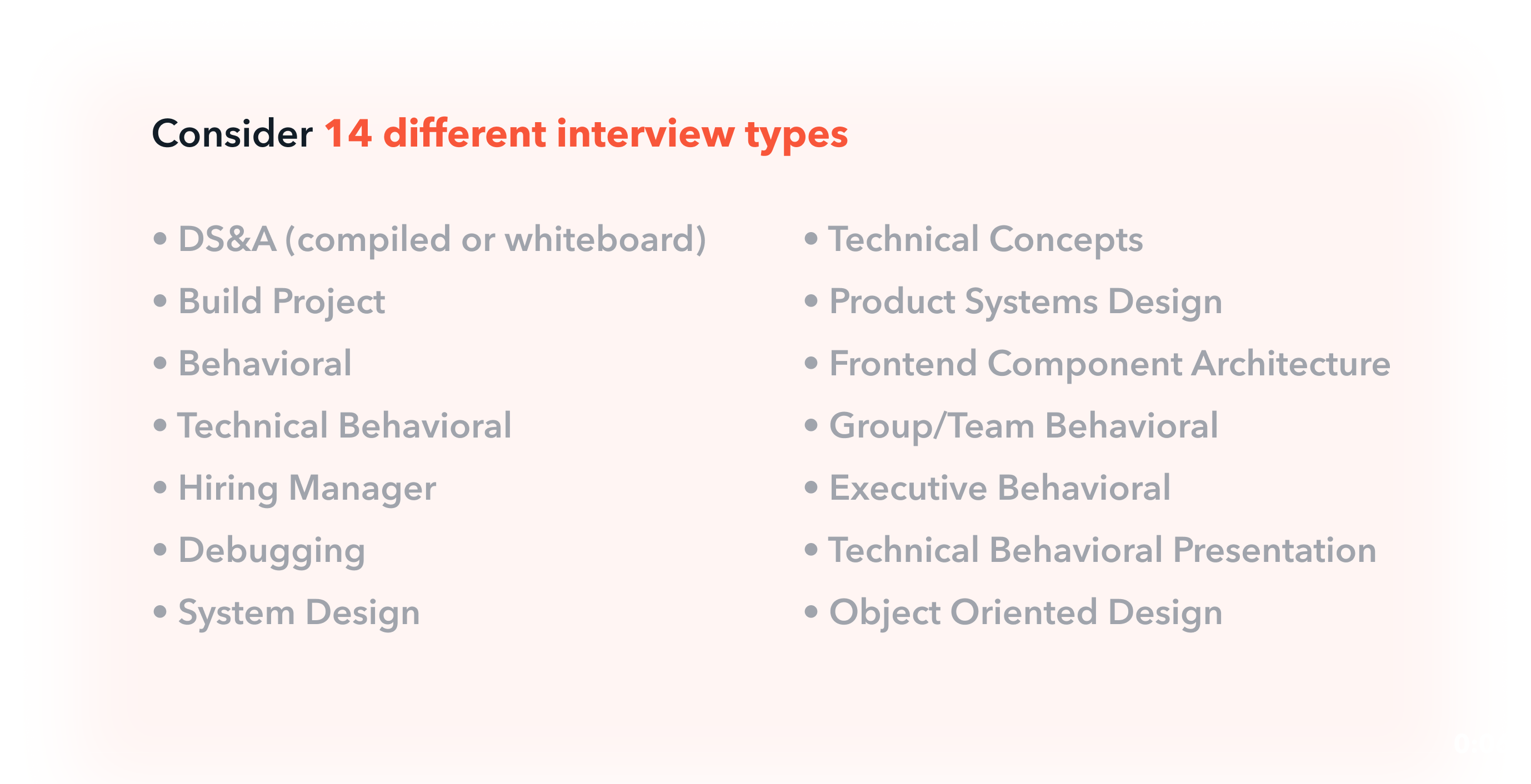
👉 Action: Design the interview for the candidate.
- Give candidates a choice between doing a take-home or a live coding interview. Typically, candidates from more traditional backgrounds prefer live coding because it’s faster; in one hour, they’re done. Candidates who get more nervous or don’t have a traditional Computer Science background may prefer to take the time to put together a more polished project for review.
- Give candidates a choice between a domain-specific coding interview in your company’s exact tech stack or open up the process and allow the candidate to choose a more agnostic algorithms-style interview.
2. Match the background to the role
Today, many of our hiring processes assume that everyone had the same career trajectory: study computer science in college > get a summer internship > land first role right out of college. The reality is that there are so many different pathways to a career in software engineering. Last year alone, 58,756 people graduated from a coding bootcamp. Hiring practices need to catch up.
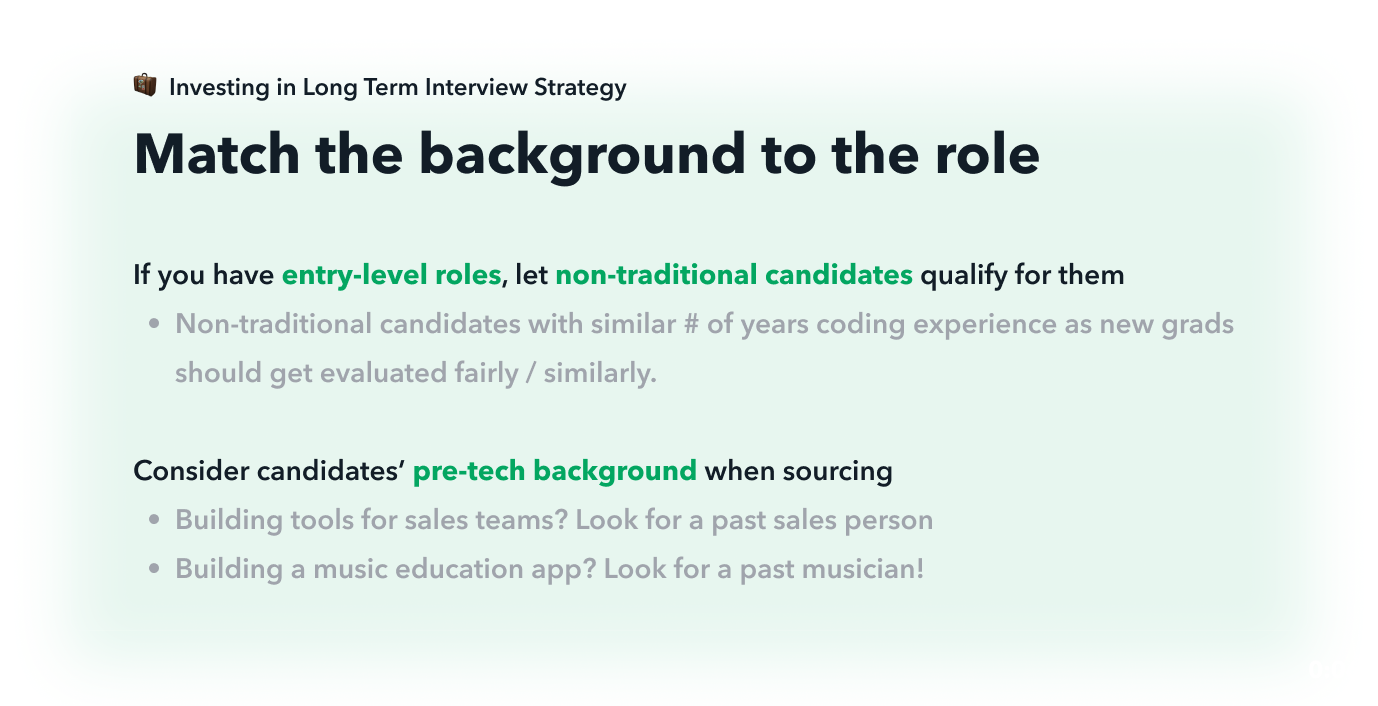
👉 Action: Allow engineers from non-traditional backgrounds with a low number of years of experience to qualify for entry-level roles.
- Many engineers with 1-2 years of experience who are self-taught or went to a bootcamp are being forced to interview for mid-level roles because they aren’t recent graduates. That means they’re often competing against a mid-level engineer (perhaps with a traditional CS background) who will have 7-8 years of total coding experience on them.
- Considering engineers from nontraditional backgrounds for entry-level roles will open up more opportunities to diversify your engineering team.
3. Create a transparent process
Engineering teams are often very hesitant to share more details about the interview process for fear that candidates will be able to cheat the system. But better preparing your candidate and setting clear expectations is something that will benefit everyone at the end of the day.
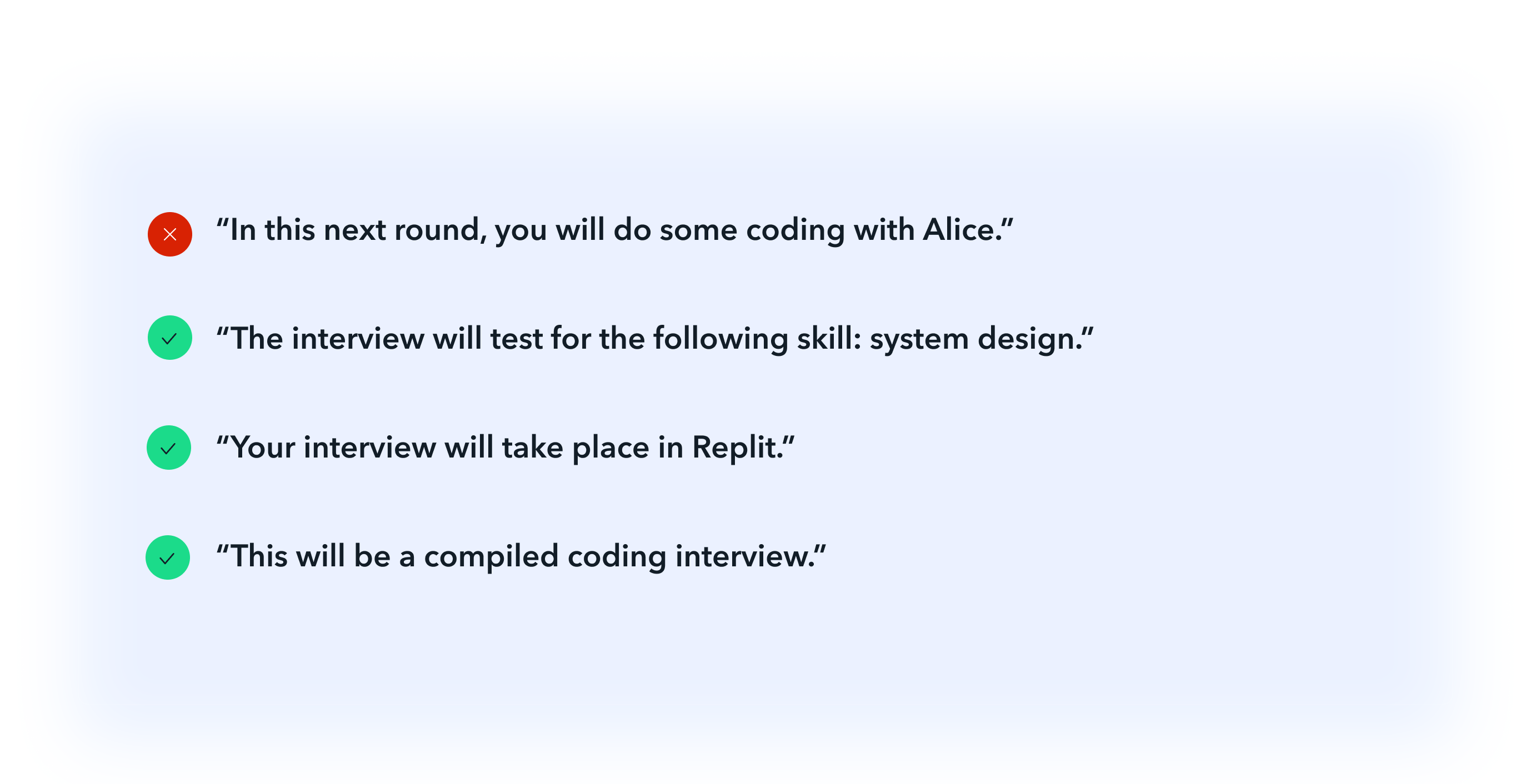
👉 Action: Provide the name of the coding environment that the interview will be conducted in and any additional details.
- This is usually something like CoderPad, CodeSignal, or Replit.
- Just providing the environment name will give candidates an opportunity to familiarize themselves with it and play around in it before the interview.
4. Provide interview practice
If we want to prepare our candidates as best we can before their interview, we have to go beyond the steps identified above; we need to proactively provide candidates with actual interview practice. Many engineering teams fall into the trap of thinking, “Giving a candidate practice opportunities will somehow invalidate the skills the interview is testing for.” But you have to remember: candidates have different levels of experience in these interviews; some may have seen/participated in many, and some may have never interviewed the way your company interviews. Getting in some practice before the real thing is a key to success.
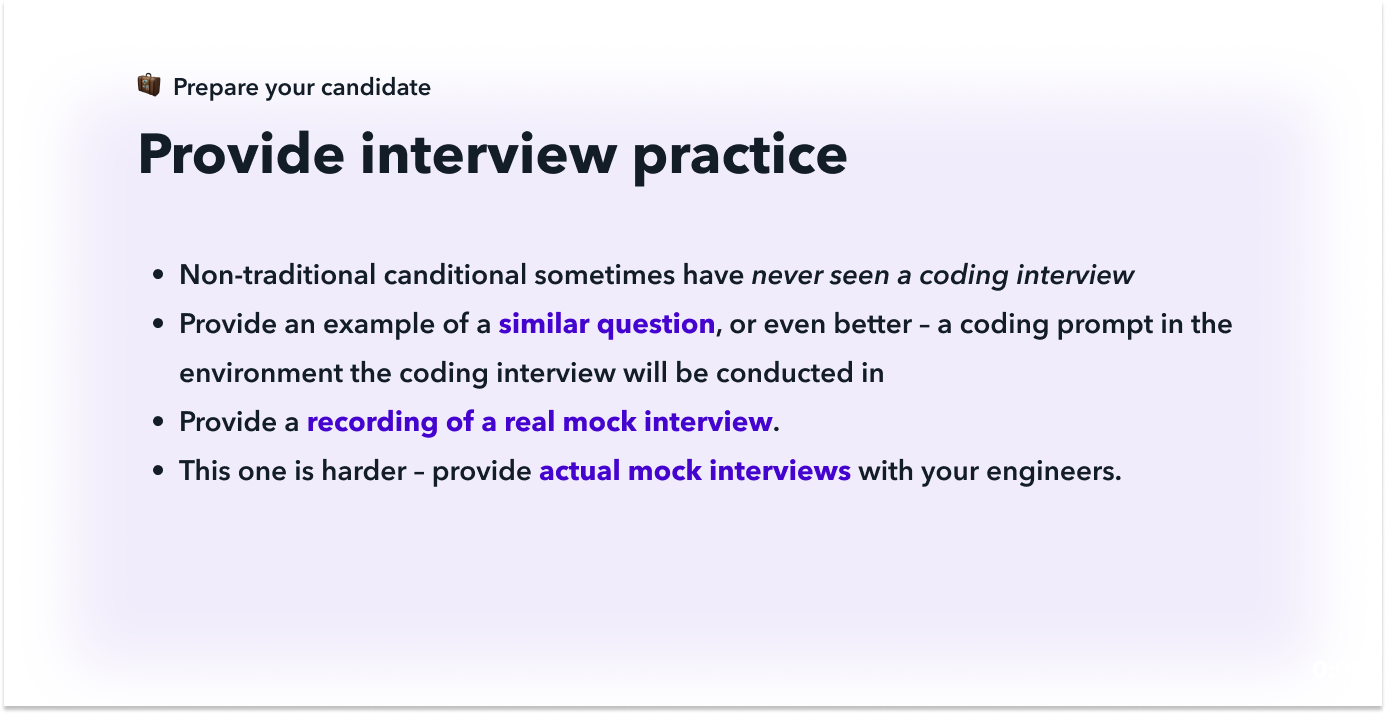
👉 Action: Provide a practice opportunity for your candidate to get them comfortable with the style of interview they can expect.
- Give your candidate a sample prompt in the actual coding environment that they will be using for their upcoming interview.
- Provide a recording of a mock interview that is similar to one that will be actually conducted, meaning one in the same coding environment and using a question that's vaguely in the same realm of topics that could be covered in the real interview.
- Provide real mock interviews. This one is a little bit of a higher effort, but that’s one of our specialties at Formation. Get in touch if you want to learn how to set up an infrastructure to provide these while driving real ROI for your candidates.
5. Give interview feedback
The industry has a long way to go in terms of creating the perfect interview feedback experience. But, that means even a little feedback today will go a long way! It’s also very likely that a candidate who interviews with your company will share their experience with friends, colleagues, and acquaintances. Providing them feedback will improve their experience, and it will have a ripple effect when the candidate shares their experience with others.
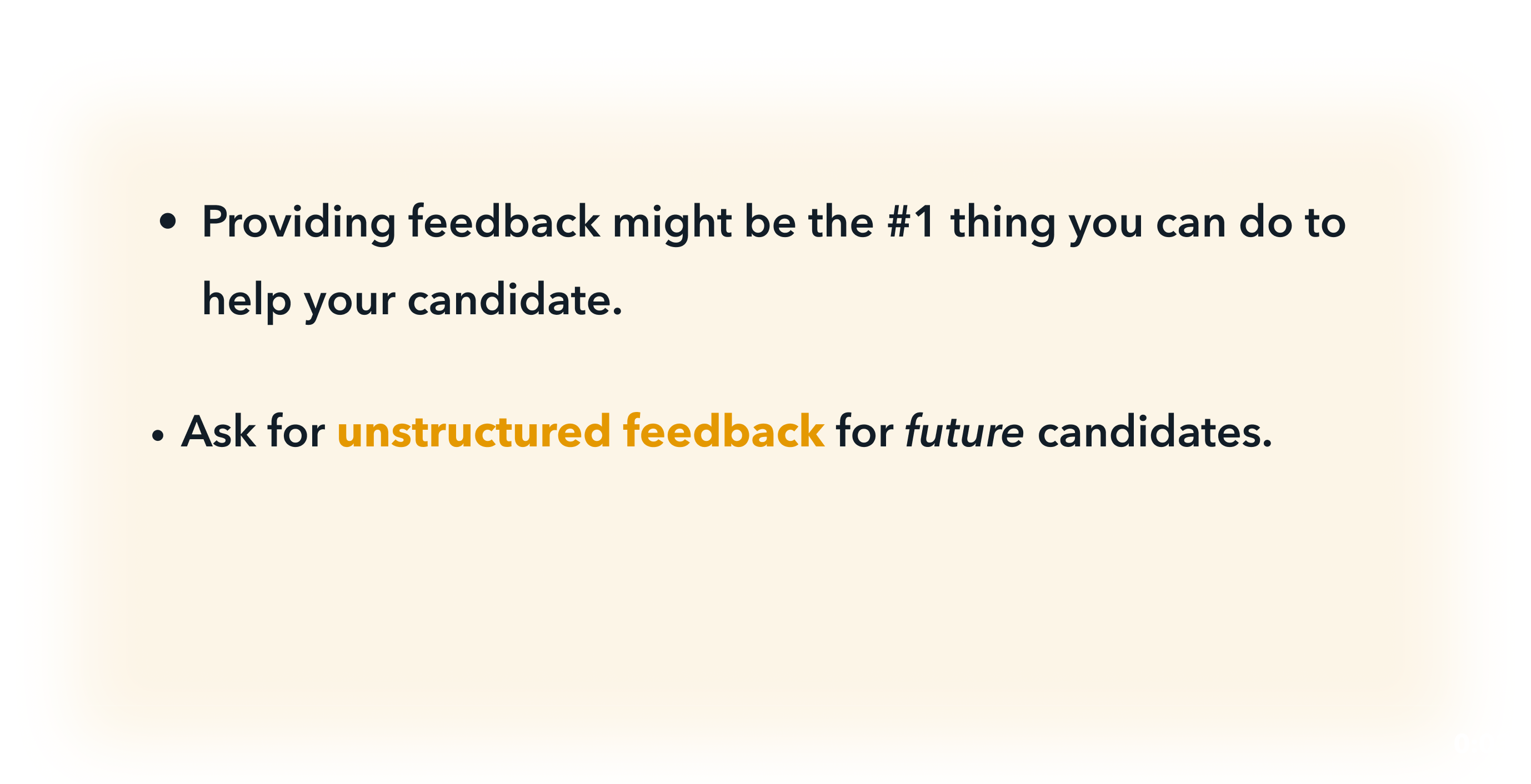
👉 Action: Create a structured form of concrete feedback points with areas of skill that your interviewers are focusing on.
- Ex.: How was the candidate’s coding style? How well did the candidate communicate their thoughts? Have your interviewer rate each question on a scale of 1 to 5.
- Providing feedback in a structured form forces interviewers to communicate precisely which skill-based signal(s) led to their “No hire”, which can reduce the risk of bias.
- Ask your interviewers for unstructured feedback on the candidates that can be used to advise you for future candidates. This doesn't necessarily help the candidate, but it can help your recruiting long-term.
Wrap-up
Your candidates may only know as much about your company’s process as you tell them. Often, they’re relying on any information they can get from their recruiter to know how to best prepare for their upcoming interviews. Increase their chances of passing a technical with just a few of these easy-to-implement actions.
If you're looking for support beyond the tips outlined above, we'd love to chat! Book time with us to discuss how we can help you improve your SWE hiring strategy.

